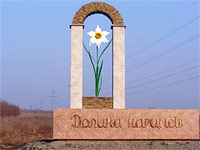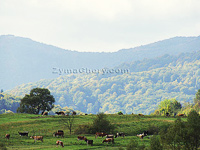The Narcissuses Valley
A pot maker, Princess and a broken vase of love
According to one legend, this charming valley appeared in the days of antiquity.
Once upon a time a young pot maker presented to the Duke’s daughter a strange vase: there were white narcissuses like fresh flowers on it surface. The Duke didn’t notice that passionate love occurred between his daughter and a pot maker. Everything was good, but that young boy was poor. A pot maker’s vase was thrown away and broken into small pieces from Duke’s mountain, come apart around the Valley where young people had gone out on dates. In the next morning white narcissuses appeared instead of broken pieces. So now we have the Narcissuses Valley, a fairy tale and a small income for the local residents.
No one knows where this place did appear. Perhaps the namely Greece God Narcissus  died on the bank of river of boredom seeing his reflection in the water, that is why white narcissuses sprouted up here. Or maybe it was the tears of the Blessed Virgin Mary dropped there where was an intention to take away the icon from the Valley with her appearance once emerged. The years go, but the legends remain.
died on the bank of river of boredom seeing his reflection in the water, that is why white narcissuses sprouted up here. Or maybe it was the tears of the Blessed Virgin Mary dropped there where was an intention to take away the icon from the Valley with her appearance once emerged. The years go, but the legends remain.

The scientists have their own “legend”. They argue that in the boulder-period a layer of fertile soil and all vegetation slipped from mountains. As a proof of this hypothesis there are the same places in the Alps, Balkans, and Carpathians. They are at a much greater altitude above the sea level, reaching 1000-2000 meters. The climate and abundance of water was favorable for expanding of narcissuses all across the Valley.
People are always treated with respect to such nature’s creation. As far back as in Austro-Hungarian Empire Kireshi valley, where the Narcissuses Valley exists as well, was under the state protection. The medicinal plants that grew in the Valley, doctors were used in its practice. Local dwellers were prohibited to use the land for agricultural purposes. Unfortunately, during the Soviet period about 50 hectares of protected land were dug up and drained. The professor of Uzhhorod National University V. I. Komendar worked hard to stop reclamation work in the Narcissuses Valley.
Nowadays the territory of the Narcissuses Valley is included to the Carpathians Biosphere Reserve. The total area of narcissuses fields is about 170 hectares. Narcissuses grow by islets. In addition more than 500 species of plants grow in the Reserve, 15 of which are listed in the Red Book of Ukraine.
Information for tourists
The flowering period is the first half of May for over two weeks. The exact date of the beginning of flowering is very difficult to specify, it is approximately after May, 10. The flowering peak period falls in the middle of May. Thousands of tourists come there at this time.
Narcissuses are listed in the Red Book of Ukraine, every year the territory of their expanding is decreased. Flowers are prohibited to cut; fine for each unit is large enough.
In May the entrance to the territory is paid. Tickets are sold the whole day.
How to get to this Valley
First of all you have to choose the road to Khust, and then according to the sign in the direction to Kireshi or the Narcissuses Valley. If necessary, local residents kindly tell you the direction.
Nearest tourist places
- Khust, Khust castle, the Khust Reformed Church – 6 km;
- Nyzhne Selyshche - is known by its cheese of high quality – 9 km;
- Iza village - is famous by its craftsmen making goods of willow withy – 5km;
- Iza village – the farm is located outside the village, where breed deer. There is an opportunity to feed deer by himself– 6 km;
- Synevir Lake - 75 km from Khust.
Address
Zakarpattia oblast
Khust region
Kireshi valley
48° 10′ 42″ N, 23° 20′ 59″ E
* Photos by V. Tverdochlib, Igor Melik
2012, the Narcissuses Valley, Khust